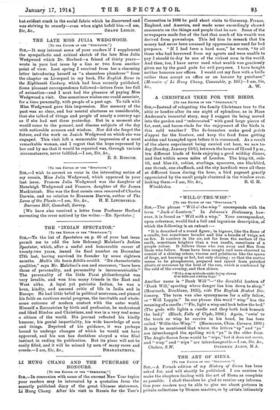" WILL-O'-THE-WISP."
[To V. E0170l or Tex •.Srscrsrosi"1 Srs,—The phrase " Will-o'-the-wisp " corresponds with the term Jack-o'-Lantern." In Johnson's Dictionary, how- ever, it is found as " Will with a wisp." Your correspondent, upon reference, would find a full and ingenious description, of which the following ie an extract "It is described of a round figure; in bigness, like the flame of a candle, but-sometimes broader and like a bundle of twigs, set on fire. It wanders in the air, not far from the surface of the earth, sometimes brighter than a wax Candle, sometimes of a purple colour. It follows those who run away and flies from those who follow. Some have been caught and were observed to consist of a shining colour, viscous and gelatinous like the spawn of frogs, not burning or hot, but only shining so that the matter seems to .be phosphorous, prepared 'and raised. from putrifien plants or carcasses by the heat of the sun, which is condensed by the cold of the evening, and then shines.
• MI-a-wisp resins& night-No-Rig clowns
Our kills and sinking bogs.' .•
Another name is "Dank Will the deceitful lantern of
'Dank Will,' sporting where danger, lies him down to sleep." (Monteath, Dunblane, 1835), vide The English Dialect Die. tionary. The term was also synonymous for a silly fellow, or - W Will Lappin." In our phrase this word " wisp" has the meaning of a candle "'Fie, light a wisp and look below the bed.' (The gude wife lights a candle and they both look beneath the bed.)" (Black, Falls of Clyde, 1806.) Again, 'tow& to the torch or wisp he carries in his hand, be bas been called ' Willie-the-Wisp.'" (Macmanue, Chia:. Corner 8. 1899.) It may be mentioned that where 'the letters " ap" und " pe " are interchanged the, spelling wi. "ps " is the older form. The Anglo-Saxon form would be " wipe," but it does not occur, and " wisp" and " wipe " are interchangeable.-1 nm, Sir, ,tc.,










































 Previous page
Previous page